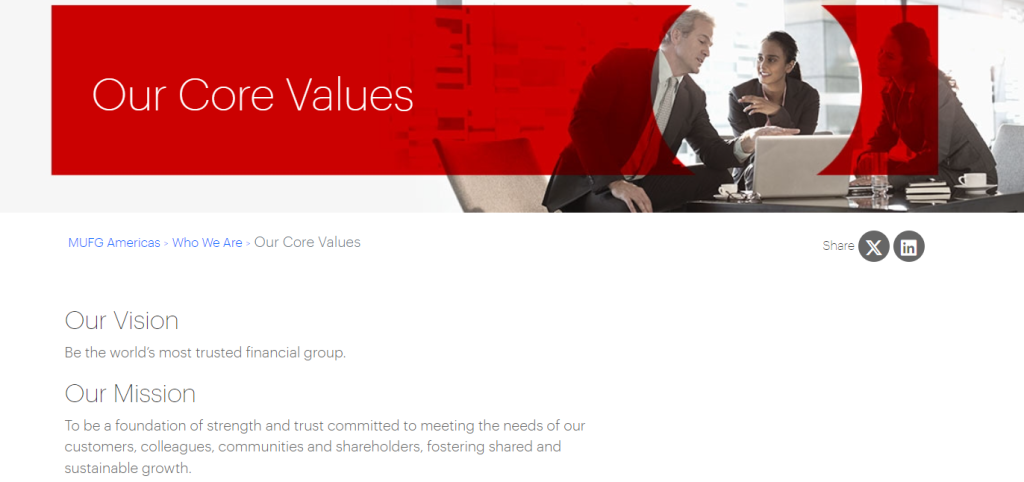Table of Contents
ToggleA Brief History of MUFG
Mitsubishi UFJ Financial Group, Inc. (MUFG) is a Japanese financial services company that was formed through the merger of Mitsubishi Tokyo Financial Group and UFJ Holdings in 2005. However, the history of MUFG dates back to the establishment of the Bank of Tokyo in 1949 and the Mitsubishi Bank in 1880.
Mitsubishi Bank and the Bank of Tokyo were two of the largest and oldest banks in Japan, with histories spanning over a century. Both banks played key roles in the Japanese financial system and economy, providing a wide range of services including corporate and investment banking, retail banking, and asset management.
In 1996, Mitsubishi Bank and the Bank of Tokyo merged to form the Mitsubishi Tokyo Financial Group, creating one of the largest and most powerful financial institutions in the world. The merger was seen as a significant step in consolidating the Japanese banking industry and strengthening its global presence.
In 2001, UFJ Holdings was formed through the merger of Sanwa Bank, Tokai Bank, and Toyo Trust and Banking, creating another major financial group in Japan. The merger was intended to increase the companies’ competitiveness in the face of a rapidly changing financial environment.
Finally, in 2005, Mitsubishi Tokyo Financial Group and UFJ Holdings merged to form Mitsubishi UFJ Financial Group, Inc. The merger created the largest financial services company in Japan and one of the largest in the world, with a diverse range of services and a strong global presence.
Today, MUFG continues to be a leading player in the global financial industry, offering a wide range of banking and financial services to customers around the world.
Who owns MUFG?
Mitsubishi UFJ Financial Group, Inc. is owned by a diverse group of shareholders, including individual investors, institutional investors, and other financial companies. The top 10 shareholders as of the most recent filing include The Master Trust Bank of Japan, Ltd., Japan Trustee Services Bank, Ltd., Japan Trustee Services Bank, Ltd. (Trust Account), State Street Bank and Trust Company, The Bank of New York Mellon, The Northern Trust Company, Custodial Department, Nikko Asset Management Co., Ltd., BlackRock Japan Co., Ltd., and Mitsubishi UFJ Trust and Banking Corporation. These shareholders collectively hold a significant portion of the company’s outstanding shares, helping to shape the strategic direction and corporate governance of Mitsubishi UFJ Financial Group, Inc.
MUFG Mission Statement

Mitsubishi UFJ Financial Group, Inc. aims to be a trusted and reliable financial partner that consistently delivers value to our customers, shareholders, employees, and the communities in which we operate. We are committed to providing innovative and sustainable financial solutions, promoting economic growth, and contributing to the well-being of society as a whole. Our mission is to build long-term relationships based on integrity, transparency, and respect, and to leverage our global reach and expertise to make a positive impact on the world.
How MUFG Makes Money?
Mitsubishi UFJ Financial Group, Inc. (MUFG) operates as a financial holding company and generates revenue primarily through its various financial services, including retail banking, corporate banking, investment banking, asset management, and wealth management. MUFG makes money through interest income from loans and credit products, fees from transaction services, investment and advisory fees, and other financial services. The company also generates revenue from its international operations and investments. Overall, MUFG’s business model focuses on providing a wide range of financial products and services to individual and corporate clients and leveraging its global presence to drive revenue growth.
MUFG Business Model Canvas
The Business Model Canvas is a strategic management and lean startup template that allows you to describe, design, challenge, invent, and pivot your business model. It provides a holistic view of the business by identifying key areas such as customers, value propositions, channels, customer relationships, revenue streams, key resources, key activities, key partners, and cost structure.
Customer Segments:
1. Retail customers
2. Small and medium-sized enterprises (SMEs)
3. Corporate clients
4. Institutional investors
5. High net-worth individuals
Value Propositions:
1. Diverse range of financial products and services
2. Strong technological capabilities
3. Global reach and presence
4. Expertise in risk management
5. Personalized customer service
Channels:
1. Brick-and-mortar branches
2. Online and mobile banking platforms
3. Financial advisors
4. ATMs
5. Corporate and investment banking offices
Customer Relationships:
1. Personal banking relationships
2. Relationship managers for corporate clients
3. Dedicated customer service teams
4. Automated customer support systems
5. Educational resources for self-service customers
Revenue Streams:
1. Interest income from loans and deposits
2. Fee-based income from investment services
3. Revenue from trading and capital markets activities
4. Wealth management fees
5. Insurance premiums
Key Resources:
1. Skilled workforce
2. Advanced technology infrastructure
3. Global network of branches and offices
4. Capital and liquidity
5. Regulatory licenses and approvals
Key Activities:
1. Lending and deposit-taking
2. Wealth management and investment advisory
3. Market-making and trading
4. Risk management and compliance
5. Innovation research and development
Key Partners:
1. Technology vendors
2. Regulatory bodies and industry associations
3. Legal and accounting firms
4. Payment processors
5. Business and community organizations
Cost Structure:
1. Employee salaries and benefits
2. IT infrastructure and maintenance
3. Market data and research
4. Compliance and regulatory costs
5. Real estate and branch network expenses
MUFG’s Competitors
Mitsubishi UFJ Financial Group, Inc. faces tough competition in the financial services industry, with several major players vying for market share. The top 5 competitors of Mitsubishi UFJ Financial Group, Inc. are:
1. Sumitomo Mitsui Financial Group
2. Mizuho Financial Group
3. Nomura Holdings
4. Daiwa Securities Group
5. Shinsei Bank
These companies are all major players in the Japanese financial services sector and compete with Mitsubishi UFJ Financial Group, Inc. in various areas such as banking, investment banking, and securities trading.
MUFG SWOT Analysis
Strengths:
1. Largest financial group in Japan
2. Diversified business portfolio including banking, securities, and asset management
3. Strong global presence with operations in over 50 countries
Weaknesses:
1. Dependence on the Japanese market
2. Vulnerability to economic downturns in the global markets
3. High exposure to potential regulatory changes and reforms
Opportunities:
1. Expansion into emerging markets
2. Growth potential in wealth management and asset management services
3. Increasing demand for digital banking and fintech services
Threats:
1. Intense competition in the financial services industry
2. Volatility in global financial markets
3. Regulatory challenges and compliance risks
Concluding Analysis
Well, after delving deep into the business model of Mitsubishi UFJ Financial Group, Inc., it’s clear to me that this conglomerate has a solid foundation for continued success. With its diversified business segments, strong global presence, and commitment to innovation and digitalization, I am confident in the future of this company. Despite the challenges and uncertainty that the financial industry may face, I believe Mitsubishi UFJ Financial Group, Inc. is well-positioned to adapt and thrive in the ever-changing market landscape. As an analyst, I see a bright and promising future for this business.
Additional Resources
To keep learning and advancing your career, we highly recommend these additional resources:
Business Model Canvas of The Top 1,000 Largest Companies by Market Cap in 2024
A List of 1000 Venture Capital Firms & Investors with LinkedIn Profiles
Peter Thiel and the 16 Unicorns: The Legacy of Thiel Fellowship












